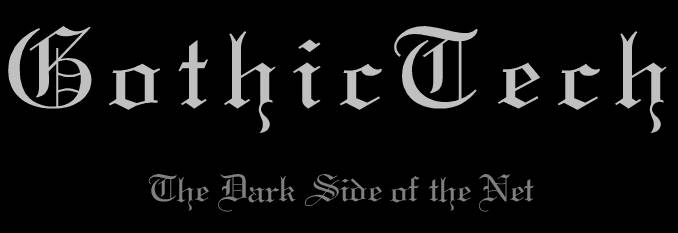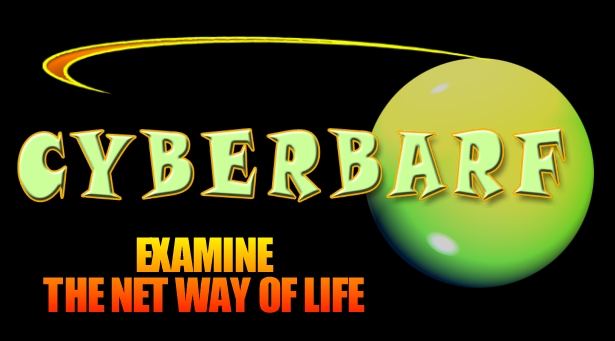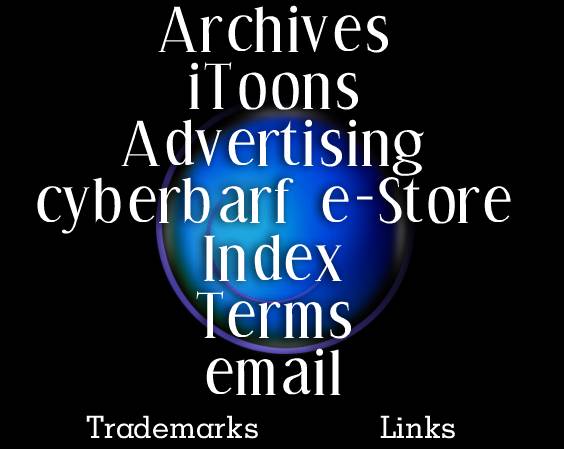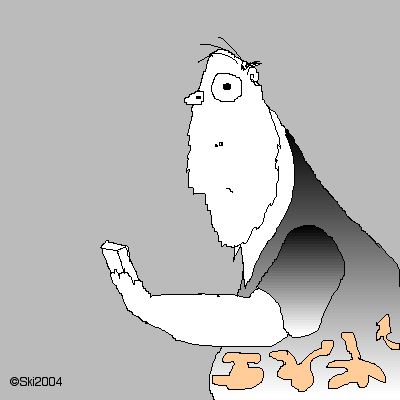cyberbarf
EXAMINE THE NET WAY OF LIFE
Vol. 5 No. 11
JUNE, 2006
|
Addiction is the uncontrollable desire to lose one's self in another world; Blasphemy is the tearing down of sacred institutions; Chat is a casual conversation that has darker meaning in the dark corners of cyberspace; Diaries of depressed souls litter the landscape dandelions in spring; Evil is a predatory emotion that feeds on the weak and naive; Fraud is a genius' unrepentant energy towards laziness; Greed is the material misrepresentation of the American Dream; Hurt is the outward expression of personal pain; Indoctrination is the systematic morphing of individuals into a utilitarian commodity; Jealousy is envy coupled with greed; Kill is the last resort in desperate times to end a desperate situation; Lust is envy coupled with personal fraud; Manipulation is the transformation of small bits into more profitable bytes; Narcissism is a cancerous mental disease which casts its wide net on a wave of cultural ignorance; Obsession is envy coupled with Kill; Prejudice is the manifestation of inner self doubt; Quagmire is the quicksand trap on any uncharted course; Revisionism is an elitist's tool to rewrite history in his or her own self righteous image; Security is a false sense of accomplishment in a troubled world; Terror is one's worst nightmare coming to reality; Unicorn Theory is a good thing being killed off in attempt to keep it pure; Violence begets more violence unless stopped by superior violence; Whining is the political equivalent of bluffing one's way through a pop quiz without understanding the subject matter; Xenomorphic site is a net page form that takes its characteristics from constituent hyperlinks and not its own form; Zing is vitality at dangerous high speeds.
|
 |
Those who turn on their computers thinking that they are secure in the internet world are wrong. The same issues, predators, darkness and deceit of the real world lurks in computer world. In the hidden dark alleys of cyberspace, the virtual world may be more dangerous. The dark side preys on the naive, whether in personal confrontations or virtual illusions. The main stream press may have fashioned the story as being the evils of illegal download sites like the original Napster, or the system wide attack by reckless hackers. But the Dark Side of the Internet experience is deeper and wider than most people think.
In certain respects, evil can lurk easier in the anonymous Internet web sites, chat rooms and personal data mining bots. “Cookies” may be a sweet treat in the real world; cookies are the involuntary sharing of personal computer information to another cybersite. More and more people know more and more about your habits, your spending preferences, your finances, your credit history and your interests than probably you know about yourself. Every mouse click can be transformed into data. Data which is culled by business enterprises to churn into mailing lists (spam) and direct marketing materials. If you walked into your local store to buy a sale item, your credit card company knows exactly what you bought, where you bought it, and how much you paid for it. The little magnetic charge card strip contains all of your financial and billing data. If you buy an item on-line, not just a merchant could be aware of your purchases. All systems are vulnerable to being compromised, hacked or misused by third parties.
Recently, a federal government worker brought home the personal information of 26 million U.S. veterans, including their names, addresses, and social security numbers. The data was stolen during a home robbery. So people are at risk even when they are not transacting any business in cyberspace. Each person's privacy which used to be sacred in one's own home is now merely an illusion. It is interesting to note that when Congress passed the first Social Security Act, the legislators specifically prohibited by penalty of law, anyone using a social security number as a national identification number. The fear was government abuse of personal liberty, like when the Nazis used to number individuals in their death camps. Did anyone take the warning to heart? No. Social security numbers became the national identification number for every individual, from the IRS, to your local department of motor vehicles. Now, there was a way to tie all information of a person under one file number.
Before, if you were robbed, it would have been face-to-face with a criminal, who would take your wallet and flee. The robber would take the cash and dump the rest in the trash because the first thing you'd do is call the police, then call your credit card companies to suspend your accounts from fraud. Now, with the lack of face to face interaction, you can be effectively robbed, your identity stolen, without you even knowing about it.
Credit card and financial companies are aware of this fact. A great deal of time and effort has been used to create programs to filter their customer's transactions to determine if there is any “suspect” activity. If so, the company contacts its customer right away to determine if a fraud is taking place. It is not just out of the kindness of customer service; but to stem the liability the company has for unauthorized transactions.
Internet extortion is a growing concern. CBS News recently reported that a Russian police official said that all criminal activities occur on the net except for murder and rape. Sites are hijacked or attacked then held for ransom. The site owner has no idea who is the extortionist, because the electronic tracks are very difficult to trace. A person is being threatened by persons who may be on the other side of the planet. Interpol believes that there is a growing element in the former Soviet bloc. Property rules of conduct do not matter in the second world countries if you do not get caught. It is rare to catch and prosecute a criminal hacker.
It is not just a matter of money. Terrorists have been using the net to plot world wide attacks. The ability to hide in the maze of IP switches, use email from public wi-fi terminals, or post comments on web pages give terrorists unlimited avenues of coordinated communications. It is ironic that bands of fundamentalists who would prefer to bomb their homelands back into the stone age are using the protocols of high technology in order to further their goals.
Military historians believe that the next great World War may be fought in cyberspace. If the western economies become dependent on electronic commerce, digital banking and virtual accounting, attackers could cause nationwide panic by destruction of the e-commerce system infrastructure. It would be the electronic version of World War I trench warfare: firewall to firewall attacks and counterattacks.
Organized crime feeds on vice. Addictions are uncontrollable impulse purchases. Internet gambling has grown to massive proportions due to the popularity of this new cable television “sporting” events. Professional gamblers are more recognizable than major league baseball players. The lure of becoming an instant millionaire has drawn thousands of people to quit their real world jobs to become full time gamers. Few realize that gambling is a zero sum game. For every dollar won, there is a dollar lost. The internet gambling boom is fostering the illusion that a rookie can easily beat a professional heads up, for the long term. Professional card players find this new crop of “dead money” and cable stardom new revenue sources to supplement their side cash games. But the gold rush mentality of thousands of players at prime events, that have skyrocketed the prize pools, but made luck just as important as skilled play, has many professional players wondering if they have turned the golden goose into godzilla.
Interpersonal relationships used to be also face to face. One could get a good reading of another person by their body language, how they conduct themselves, what they are like in person. In cyberspace, unless connected to a fast, real time video hook-up, the “chat” among individuals is like speaking in pitch darkness. Predators pose as friends in these dark corners looking for young victims. Police are aware of this; a standard operating procedure is to monitor these network areas and pose as potential victims to root out predators. But as the Internet expands, and access is becoming as easy as dialing a telephone, it is harder and harder to spot such transgressions. Many parents fear for their children playing unsupervised in the neighborhood parks. There are too many creeps that could be stalking their city. But one cannot be naive that those same creeps are not stalking around the confines of cyberspace.
There is also a growing level of unprofessionalism. One example is the explosion of plagiarism in the education system. Before the Internet, students had to go to the library, read books and periodicals, write or type out a report (with source bibliography) in order to pass a course. Today, more and more students merely get on-line, do a keyword search, then cut - and -paste passages of the results into their word processor. It is lazy way of getting homework done. In reality, it is not learning. The student is not working to find answers, but merely taking the easiest route to the finish. There is also the illusion that everything on the Internet is true. Truth has been so politicized in America that anything anyone believes can be called truth. Truth used to be defined as an objective fact, easily confirmed and proven by historical annotation or current objective observation. This road to lifting other people's work for one's own is not confined to the classroom; numerous high profile examples at major newspapers have rocked the journalism profession. The principle of the work ethic has been diluted by the flood of free information of the Internet and the ease to which it can be accessed, copied and rebundled into a work statement.
This is not to say that the world needs to go back to its puritanical rootstock. Some early sects banned all forms of technology. Technology was believed to be an evil diversion from their fundamental biblical blueprints. These religious communities were founded upon strict religious principles. People were taught on how to behalf. People were taught what was expected from each individual member. People were taught the values needed in order to contribute to their community. There was a form of stability in this unwieldy system.
Cyberspace has no such restrictions. It is the Wild Wild West without any geographic, geopolitical, or gateway filters. Anyone can say just about anything on a web page. The free forum of ideas is generally concerned a good thing in the democratic discourse of a nation. But when the ethics of public institutions are corrupted by the unchecked, unfiltered lies, deceptions and politics of personal gain, the nation is at risk that its freedoms can be eroded to nothing. Bloggers creating libelous statements about politicians cause the courts to come down hard on all Internet publishers. Politicians attempt to censor the blogs, which then it is argued to censor the general press, which leads to an outright assault on the Fourth Estate by the Justice Department, looking to jail reporters who won't give up their confidential sources on stories which could have a major impact on national policy.
Private diaries are now public documents. The freedom to distribute one's personal thoughts, opinions and images have created a growing class of transparent lives. Live web cams; graphic detail of personal events; open pysche therapy sessions in text. How these very personal pages will affect its audience is unknown. The only effect seen so far is that more and more people are putting these private pages on the net. Misery loves company.
If more and more people have no inhibitions to opening their lives to the general public, the whole concept of personal privacy can be erroded by government actions. A culture of norms is a fluid consensus of public opinion. Politicians are using their own polling data to push and pull public opinion. At a certain point, the lament is that “everyone is doing it, so it must be okay.” It is not okay for the government to spy on its own citizens, to make warrantless searches of private information, or to know how you vote. The Constitution protects you against government tyranny. But the internet allows government officials to erode the concept of personal privacy by secretly data mining anyone at any time.
There is also the dark allure of cyberspace. People have become addicted to the medium. With endless choices and sites, one can spend an entire lifetime and not see it all. It is the Mount Everest of Information and Entertainment. So drawn into this sphere, many people have given up on their real world lives, and now “work” in cyberworlds, playing group life simulation games. They create a whole new life, habitat, property, material goods, and wealth which other players are willing to pay or trade. The amount of real dollars flowing into cybereconomies is growing. And so is the hostile bitterness of bad deals, breaches of contract, and theft. A few court cases have surfaced where players are suing the game creators or administrators for taking their cyberproperty worth thousands of dollars without cause. And here is where the divide between real and unreal gets mixed up; the present court system is already overloaded and breaking down. One does not need to add cyber disputes to the docket. A cyberworld dispute probably should be resolved in a cyber arbitration among a jury of their cyberpeers.
It is not to say that the plug should be pulled on the entire Internet People need to take notice that the security measures they have walking down their streets should be the same radar when they are on-line. Children need to be taught what is safe and what is not safe when surfing the net, just as a life guard tells a surfer when not to go into the ocean. Common sense seems to becoming harder and harder to find in modern society. Common sense is the first line of personal defense.
We are at the medieval point of the Internet life cycle. There are dangerous lurking in the streets; hidden viruses that can wipe out families or systems. There are secret monks that are programming the next great thing. There are hordes of privacy cops waiting to swoop down like Crusaders looking for lost artifacts. There are bands of vandals waiting to sack unsuspecting villages. But there is still the promise of technology that change will create a better future. How normal users police themselves will determine whether the seedier elements of society will materially destroy the promise of the internet.
cyberbarf
EXAMINE THE NET WAY OF LIFE
iPod,Therefore, iAmNEW T-SHIRT AT THE CYBERBARF STORE!
|
THE REAL NEWS ----------PINDERMEDIA.COM
Don't forget to check out the
CYBERBARF BARF BAG podcast.




